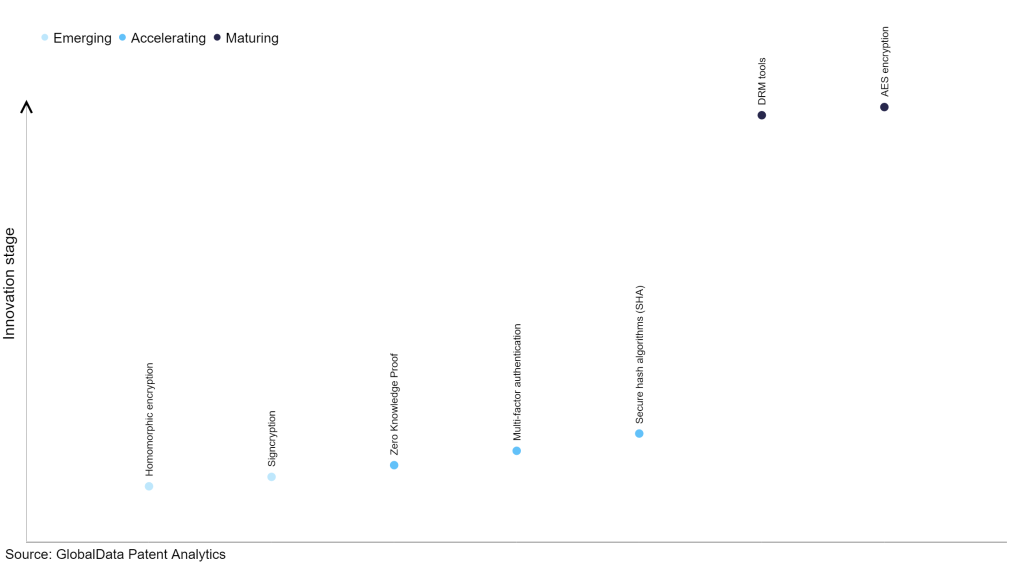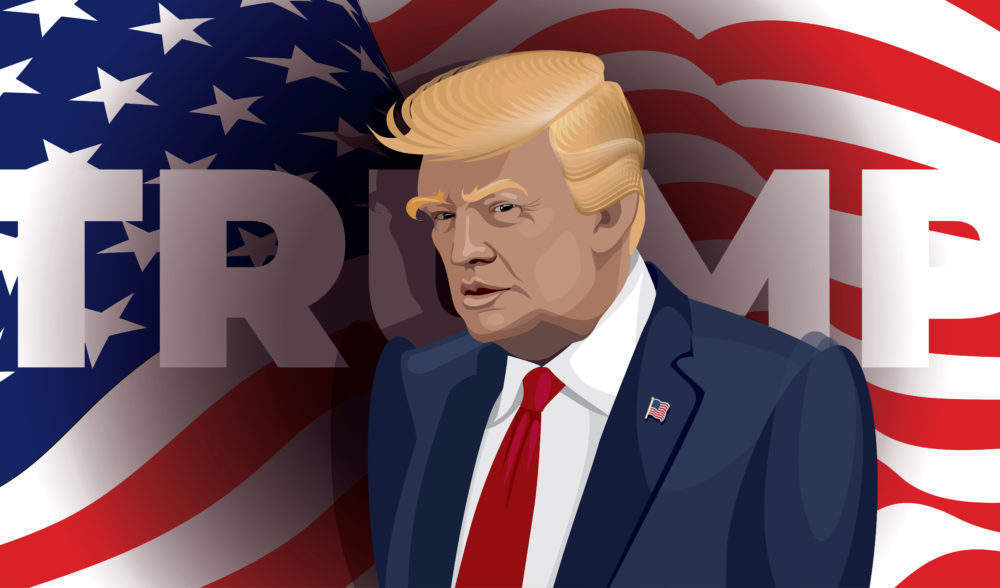The technology industry continues to be a hotbed of patent innovation. Activity is driven by the escalating cyber threats, stringent regulatory compliance requirements, and the increasing adoption of advanced technologies, and growing importance of technologies such as deep packet inspection, intrusion prevention systems, and application-layer filtering. In the last three years alone, there have been over 1.5 million patents filed and granted in the technology industry, according to GlobalData’s report on Cybersecurity in technology: multi-level security firewalls. Buy the report here.
However, not all innovations are equal and nor do they follow a constant upward trend. Instead, their evolution takes the form of an S-shaped curve that reflects their typical lifecycle from early emergence to accelerating adoption, before finally stabilizing and reaching maturity.
Identifying where a particular innovation is on this journey, especially those that are in the emerging and accelerating stages, is essential for understanding their current level of adoption and the likely future trajectory and impact they will have.
185+ innovations will shape the technology industry
According to GlobalData’s Technology Foresights, which plots the S-curve for the technology industry using innovation intensity models built on over 1.6 million patents, there are 185+ innovation areas that will shape the future of the industry.
Within the emerging innovation stage, homomorphic encryption and signcryption are disruptive technologies that are in the early stages of application and should be tracked closely. Zero knowledge proof, multi-factor authentication and secure hash algorithms (SHA) are some of the accelerating innovation areas, where adoption has been steadily increasing. Among maturing innovation areas are DRM tools and AES encryption, which are now well established in the industry.
Innovation S-curve for cybersecurity in the technology industry

Multi-level security firewalls is a key innovation area in cybersecurity
A multi-level security firewall employs distinct security measures at different network levels to guard against cyber threats. The strategy encompasses multiple tiers of defense working in tandem to thwart unauthorized entry, prevent data leakage, and avert potential security breaches.
GlobalData’s analysis also uncovers the companies at the forefront of each innovation area and assesses the potential reach and impact of their patenting activity across different applications and geographies. According to GlobalData, there are 190 companies, spanning technology vendors, established technology companies, and up-and-coming start-ups engaged in the development and application of multi-level security firewalls.
Key players in multi-level security firewalls – a disruptive innovation in the technology industry
‘Application diversity’ measures the number of applications identified for each patent. It broadly splits companies into either ‘niche’ or ‘diversified’ innovators.
‘Geographic reach’ refers to the number of countries each patent is registered in. It reflects the breadth of geographic application intended, ranging from ‘global’ to ‘local’.
Patent volumes related to multi-level security firewalls
| Company | Total patents (2010 - 2022) | Premium intelligence on the world's largest companies |
| eMemory Technology | 21 | Unlock Company Profile |
| Qualcomm | 66 | Unlock Company Profile |
| Microsoft | 106 | Unlock Company Profile |
| Texas Instruments | 72 | Unlock Company Profile |
| Apple | 120 | Unlock Company Profile |
| Dell Technologies | 132 | Unlock Company Profile |
| Compellent Technologies | 10 | Unlock Company Profile |
| General Electric | 8 | Unlock Company Profile |
| Advanced Micro Devices | 20 | Unlock Company Profile |
| Nokia | 10 | Unlock Company Profile |
| Panasonic | 11 | Unlock Company Profile |
| Canon | 58 | Unlock Company Profile |
| Infineon Technologies | 9 | Unlock Company Profile |
| IBM | 39 | Unlock Company Profile |
| Broadcom | 15 | Unlock Company Profile |
| The Charles Stark Draper Laboratory | 9 | Unlock Company Profile |
| BlackBerry | 11 | Unlock Company Profile |
| Toshiba | 21 | Unlock Company Profile |
| Intel | 359 | Unlock Company Profile |
| Micron Technology | 54 | Unlock Company Profile |
| Semiconductor Energy Laboratory | 9 | Unlock Company Profile |
| Chipone Technology (Beijing) | 7 | Unlock Company Profile |
| Shenzhen Goodix Technology | 9 | Unlock Company Profile |
| Kioxia | 9 | Unlock Company Profile |
| Aurora Labs | 110 | Unlock Company Profile |
Source: GlobalData Patent Analytics
Among the companies innovating in multi-level security firewalls, Apple is one of the leading patent filers. The company’s patents are aimed at describing the methods and devices pertaining to the dynamic configuration of packet pools within networking stack architectures. In contrast to earlier approaches involving fixed memory allocations, the embodiments outlined here empower packet pools linked to applications in non-kernel spaces to flexibly assign more memory to a specific non-kernel space application, or alternatively, to reduce the memory allocated to it.
Other versions of this disclosure introduce the division of a memory allocation into portions accessible by devices and those accessible by the kernel. Additional variants involve adjusting the sizes of specific segment allocations to align with multiples of a physical address page size. This particular variant streamlines the process by requiring just a single input/output (I/O) bus address lookup for the designated segment, thereby minimizing the lookup costs associated with I/O operations for that segment. Other prominent patent filers in the space include Apple and Dell Technologies.
In terms of application diversity, Vodafone Group leads the pack, while Microsoft and Intel are in second and third positions, respectively. By means of geographic reach, Aurora Labs held the top position, followed by Vodafone Group and eMemory Technology.
Multi-level security firewalls hold paramount significance in fortifying network defenses. By employing layered protection mechanisms, they act as a formidable barrier against a wide range of cyber threats. These firewalls filter incoming and outgoing traffic based on predefined security rules, significantly reducing the risk of unauthorized access, data breaches, and cyberattacks. Their importance is particularly evident in industries where sensitive information is paramount, such as finance, healthcare, and government.
To further understand the key themes and technologies disrupting the technology industry, access GlobalData’s latest thematic research report on Cybersecurity.
Data Insights
From

The gold standard of business intelligence.
Blending expert knowledge with cutting-edge technology, GlobalData’s unrivalled proprietary data will enable you to decode what’s happening in your market. You can make better informed decisions and gain a future-proof advantage over your competitors.







